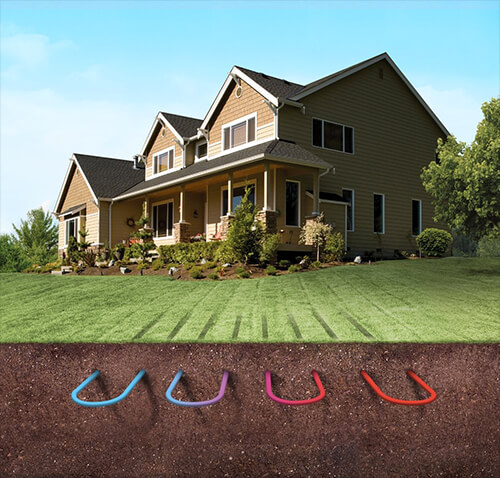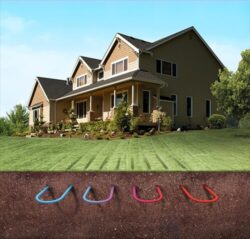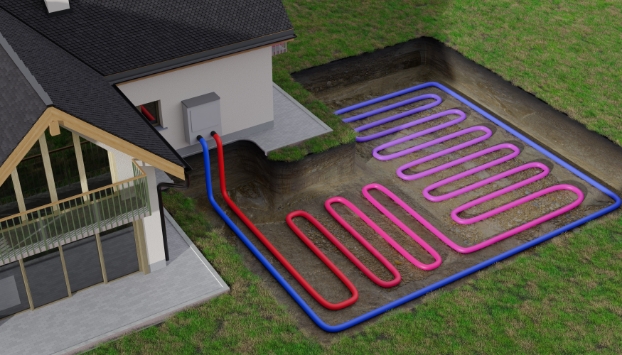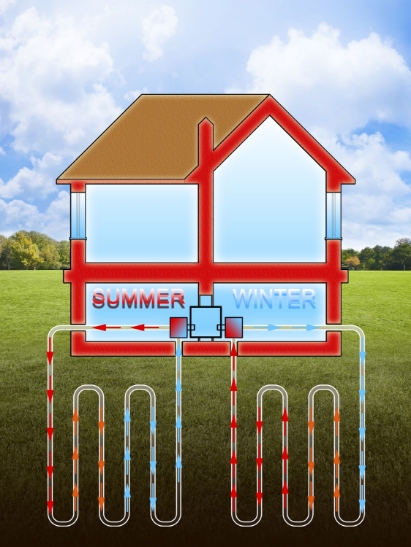Myths About Geothermal Heating & Cooling

Get the Facts
Dispelling Myths About Geothermal Heating & Cooling
Geothermal heating and cooling systems are becoming increasingly popular as more homeowners look for ways to reduce their utility bills. But unfortunately, some myths about geothermal systems prevent people from taking advantage of this efficient and reliable technology.
Here are a few common myths about geothermal systems that are not true.
Geothermal Systems Are Hard to Install
People believe installing a geothermal heating and cooling systems is difficult or expensive. However, most geothermal systems are surprisingly easy to install and don’t require many significant modifications to your home. Depending on the setup, you may need to dig a well or install a series of tubes in your backyard. However, the process is straightforward and similar to installing a standard HVAC system.
They Are Expensive to Maintain
Some people believe that geothermal energy systems are expensive to maintain. While it is true that some components of a geothermal system may require regular maintenance, the overall cost of maintaining a geothermal system is lower than that of traditional HVAC systems. In addition, the savings you’ll get from using geothermal energy can more than pay for any maintenance costs.
Geothermal systems are very low-maintenance compared to traditional HVAC systems. The only regular maintenance required is occasionally checking the system and changing the air filters.
Additionally, most geothermal systems come with a long-term warranty, which covers any major repairs or replacements that may be needed. This means homeowners can enjoy peace of mind knowing that their system is protected from any potential problems.
Geothermal Systems Are Not Environmentally Friendly

Most geothermal systems also come with Energy Star ratings, ensuring they are energy efficient and use less electricity than traditional HVAC systems. As a result, they can help you save money on your energy bills and contribute to a cleaner environment.
Geothermal Systems Are Not Reliable
Geothermal heating and cooling systems are reliable. The components of a geothermal system are designed to last for many years. Even after many years of use, the system will still provide efficient and reliable heating and cooling, as long as you maintain it well.
Because geothermal systems are so reliable, they can often be used in remote locations where other methods would not be able to function due to the lack of electricity or natural gas. This makes them an ideal choice for those who need reliable heating and cooling in their homes.
Geothermal Systems Are Too Loud
Another common myth about geothermal systems is that they are too loud. Geothermal systems are much quieter than traditional HVAC systems because they do not use moving parts, so there is no noisy fan or compressor to create noise. You will only hear a slight hum when the unit turns on and off, which is usually not loud enough to be heard in most rooms.
The heat pump and other components are also located outside the home, keeping them away from living areas. This ensures that any noise from the system will not disturb those living inside.
Geothermal Systems Are Unsafe
Geothermal systems are as safe as other heating and cooling systems. They are even safer since they don’t require combustible fuels like natural gas or propane.
Additionally, most geothermal systems are designed to shut off automatically in a power outage or other emergency. This ensures that your home remains comfortable and the system stays safe.
Geothermal Systems Require a Lot of Space

In addition, some geothermal systems are designed to be installed vertically, which helps to reduce the amount of space needed. This allows smaller property owners the ability to install a geothermal system.
Geothermal Systems Don’t Work in All Areas
Some people believe that geothermal systems are not suitable for all areas. However, geothermal systems can work in any climate or region.
For example, people believe cold areas are unsuitable for geothermal systems because the ground loop needs to be buried underground, and colder temperatures will freeze the system. However, special techniques are designed for areas with climate extremes. These systems can provide efficient and reliable heating and cooling even in frigid temperatures.
However, ensuring that your home meets the requirements for installing a geothermal system is essential. A professional installer can help you determine if your home is suitable for a geothermal system.
Geothermal Systems Cannot Be Retrofitted
There is also a belief that existing structures cannot be fitted with a geothermal system. However, many geothermal systems can be installed in existing homes without significant renovations or changes. In some cases, a professional installer may need to make minimal modifications to the existing building to install the system properly.
Geothermal Systems Are Expensive

Furthermore, geothermal systems are highly energy-efficient, meaning homeowners can save significant money on their energy bills over time. When combined with the initial cost savings, geothermal systems can become one of the most cost-effective HVAC solutions.
Geothermal Systems Cannot Heat Water
Heating water is not a possible function of a geothermal system. However, many geothermal systems come equipped with a built-in water heater, which allows you to use geothermal energy to heat your home’s hot water. This can provide an additional source of energy efficiency as well as lower utility bills.
In addition, some geothermal systems come with a desuperheater, which can be used to preheat the water in your hot water tank. This helps reduce the energy needed to heat the water, which can lead to even more savings.
Geothermal Systems Cannot Cool Homes
Geothermal systems can be used to heat homes but not for central cooling. However, geothermal systems work just as well for cooling as they do for heating. The system reverses the energy flow, using the ground’s natural temperature to cool your home. This is one of the main benefits of geothermal systems, as they can provide year-round comfort in any climate or region.
Moreover, geothermal systems are incredibly efficient when it comes to cooling. This means homeowners can enjoy a more comfortable home without worrying about sky-high energy bills.
Overall, geothermal systems offer an affordable and efficient solution for heating and cooling your home all year. With the help of a professional installer, you can enjoy the energy-saving benefits of geothermal systems for years to come.
Hoff Heating & AC is a professional heating and air conditioning company in O’Fallon, MO, specializing in geothermal systems, air conditioners, heat pumps, furnaces, and humidifiers. We can help you find the perfect solution for your home’s heating and cooling needs. Contact Hoff Heating & AC today for more information about our services!


